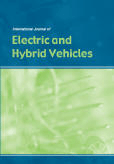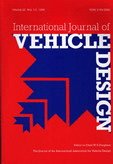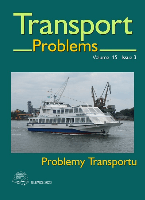
International Journal of Electric and Hybrid Vehicles
Scope & Guideline
Exploring Cutting-Edge Technologies for Greener Transportation
Introduction
Aims and Scopes
- Electric Drive Systems and Control:
Research on electric drive systems, including design, control strategies, and optimization techniques for various types of motors such as permanent magnet synchronous motors (PMSM) and induction motors. - Battery Management and Energy Storage:
Studies focused on battery technologies, management systems, state of charge estimation, and energy storage solutions that enhance the performance and reliability of electric vehicles. - Charging Infrastructure and Techniques:
Investigation of various charging methods, on-board chargers, and infrastructure development to support the growing electric vehicle market. - Hybrid and Alternative Powertrains:
Exploration of hybrid vehicle designs, powertrain configurations, and integration of alternative energy sources like fuel cells and supercapacitors. - Vehicle Dynamics and Performance Optimization:
Research on vehicle dynamics, control systems, and performance analysis to improve the efficiency and user experience of electric and hybrid vehicles. - Emerging Technologies and Innovations:
Focus on the application of advanced technologies such as machine learning, blockchain, and IoT in enhancing electric vehicle performance and infrastructure.
Trending and Emerging
- Machine Learning and AI Applications:
There is a growing trend in applying machine learning and artificial intelligence to predict battery performance, optimize vehicle control systems, and enhance overall vehicle efficiency. - Wireless Charging Technologies:
Research on wireless power transfer and charging systems is gaining momentum, highlighting the need for convenient and efficient charging solutions in electric vehicle infrastructure. - Integration of IoT in Vehicle Systems:
The integration of Internet of Things (IoT) technologies is emerging as a key area of focus, enabling smarter transportation systems and improved connectivity for electric vehicles. - Sustainable and Eco-friendly Practices:
An increasing number of studies are addressing sustainable materials and eco-friendly practices in the manufacturing and operation of electric vehicles, reflecting a broader environmental consciousness. - Autonomous Vehicle Technologies:
Research into autonomous systems and their application in electric vehicles is on the rise, driven by advancements in sensor technology and control algorithms.
Declining or Waning
- Traditional Internal Combustion Engine Technologies:
There is a noticeable decline in research focused on conventional internal combustion engine technologies as the emphasis shifts toward electric and hybrid solutions. - Basic Battery Chemistry Studies:
Research on fundamental battery chemistry and materials has decreased, likely due to a shift towards more applied studies in battery management and integration. - Conventional Vehicle Design Approaches:
Interest in traditional vehicle design methodologies is waning, as innovative design strategies utilizing advanced materials and technologies gain prominence. - Limited Scope of Regulatory and Policy Studies:
There has been a reduction in papers discussing regulatory frameworks and policy implications for electric vehicles, possibly due to a greater focus on technological advancements. - Static Energy Efficiency Models:
The focus on static energy efficiency models is decreasing as researchers increasingly adopt dynamic and real-world simulation approaches to assess vehicle performance.
Similar Journals

SAE International Journal of Vehicle Dynamics Stability and NVH
Driving Innovation in Automotive Engineering and BeyondSAE International Journal of Vehicle Dynamics Stability and NVH is a prestigious publication dedicated to advancing knowledge in the domains of automotive engineering, computational mechanics, control and optimization, and mechanical engineering. Published by SAE International, this journal boasts an impressive impact factor within its category, achieving a Q1 ranking in 2023 across multiple fields, including automotive engineering and computational mechanics. With ISSN 2380-2162 and E-ISSN 2380-2170, it serves as a crucial platform for the dissemination of innovative research and technological advancements in vehicle dynamics and noise, vibration, and harshness (NVH) analysis. Researchers, professionals, and students benefit from the journal's rigorous peer-review process and its commitment to high-quality publications. With a wide-reaching influence and an emphasis on interdisciplinary approaches, the journal is pivotal for those seeking to contribute to the evolution of vehicle technology and related areas.

Journal of Power Electronics
Exploring the Future of Power TechnologyJournal of Power Electronics, published by Springer Heidelberg, stands as a pivotal resource in the fields of Control and Systems Engineering and Electrical and Electronic Engineering. With an ISSN of 1598-2092, this esteemed journal has been disseminating high-quality research since its establishment in 2008, aiming to explore advancements and innovations in power electronics technology. While it currently holds a respectable Q3 quartile ranking in both engineering categories for 2023, its impact is underscored by its inclusion in various scientific indices, facilitating greater visibility for authors and readers alike. Although it operates on a subscription model, the journal remains dedicated to providing researchers, professionals, and students with a comprehensive viewpoint on emerging trends and methodologies in power electronics. With converged years extending to 2024, the Journal of Power Electronics continues to contribute significant insights to the academic community and industry alike, making it an essential platform for disseminating knowledge in this rapidly evolving field.

European Journal of Transport and Infrastructure Research
Advancing transport knowledge for a sustainable future.The European Journal of Transport and Infrastructure Research (EJTIR) is a premier academic journal dedicated to advancing the field of transport and infrastructure studies. Established in 2000 and published by the EDITORIAL BOARD EJTIR in the Netherlands, this open-access journal promotes the dissemination of high-quality research through a global platform. With an impressive categorization in the Q2 quartile for Geography, Planning, and Development, as well as Urban Studies, and a Q3 ranking in Transportation as of 2023, EJTIR is recognized for its significant contributions to these vital disciplines. It holds commendable Scopus rankings, reflecting its impact and relevance in the social sciences. The journal's objectives include fostering innovative research, facilitating a dialogue among scholars, practitioners, and policymakers, and addressing contemporary transportation challenges. The open access model ensures that research findings are accessible to a wider audience, thereby promoting evidence-based decision-making in transport policies and infrastructure development. Researchers, professionals, and students are encouraged to engage with the journal's content, contributing to the ongoing discourse in this essential field.

IEEE Open Access Journal of Power and Energy
Connecting Ideas, Driving Progress in Power TechnologyIEEE Open Access Journal of Power and Energy is a leading scholarly publication dedicated to advancing research and innovation in the fields of electrical and electronic engineering as well as energy engineering and power technology. Published by the prestigious IEEE-INST ELECTRICAL ELECTRONICS ENGINEERS INC, this fully open-access journal has been a vital resource for the dissemination of impactful findings since its establishment in 2020. With an impressive Q1 ranking in both Electrical and Electronic Engineering and Energy Engineering and Power Technology, it has garnered recognition for its rigorous peer-review process and quality content. Moreover, it ranks favorably within the top percentiles of Scopus, acknowledging its contributions to the global discourse on energy solutions. The journal offers unique access options that encourage broader readership and collaboration among researchers, professionals, and students eager to explore the latest advancements in power and energy systems. Located in the United States, this journal plays an essential role in shaping the future of sustainable energy and technological innovation.

SAE International Journal of Commercial Vehicles
Transforming Ideas into Innovations for Commercial VehiclesSAE International Journal of Commercial Vehicles, published by SAE International, stands at the forefront of automotive engineering research, fostering innovation and development in the commercial vehicle sector. With an ISSN of 1946-391X and an E-ISSN of 1946-3928, the journal plays a critical role in disseminating high-quality research, theoretical advancements, and practical applications across various facets of commercial vehicles. As part of the notable SAE publication portfolio, it enjoys a respectable 2023 Q3 ranking within the automotive engineering category and holds a significant position at Rank #72/125 in Scopus, reflecting its growing impact and relevance. The journal's themes encompass innovative technologies, safety advancements, and regulatory developments, providing researchers and industry professionals with vital insights essential for tackling contemporary challenges. Though currently not an open-access publication, its contribution to the engineering community is invaluable, paving the way for future studies and collaborative efforts in the automotive field.

INTERNATIONAL JOURNAL OF VEHICLE DESIGN
Advancing Knowledge in Vehicle Design and PerformanceThe INTERNATIONAL JOURNAL OF VEHICLE DESIGN is a distinguished publication that has been at the forefront of automotive engineering and mechanical design since its inception in 1979. Published by INDERSCIENCE ENTERPRISES LTD in the United Kingdom, this journal aims to foster innovative research and technical knowledge in the field of vehicle design, encompassing various aspects from conceptualization to manufacturing and performance analysis. With an ISSN of 0143-3369 and an E-ISSN of 1741-5314, the journal extends its accessibility to a global audience, although it currently does not operate under an open access model. Recognized for its scholarly contributions, it holds a Q3 ranking in Automotive Engineering and a Q4 ranking in Mechanical Engineering as of 2023, reflecting its position among peers with an increasing impact in the discipline. Researchers, professionals, and students will find valuable insights and cutting-edge research in the articles published, contributing to a deeper understanding of advancing vehicle technologies and methodologies. For inquiries, the journal is based at the World Trade Center Building, 29 Route de Pré-Bois, Case Postale 856, CH-1215 Geneva, Switzerland, where one can also follow its developments and contribution to the growing body of knowledge in vehicle design.

Transport Problems
Pioneering Research for Global Transport ChallengesTransport Problems, published by the Silesian University of Technology, Faculty of Transport, is a distinguished open-access journal that has been advancing scholarship in the fields of Automotive Engineering, Mechanical Engineering, and Transportation since its inception in 2007. With an ISSN of 1896-0596 and an E-ISSN of 2300-861X, this journal serves as a vital platform for researchers and practitioners to disseminate innovative research findings and explore fundamental issues in transport systems and technologies. Based in Poland, the journal covers various topics including transportation logistics, vehicle dynamics, and environmental impacts, thereby addressing critical challenges faced in the transportation sector globally. As reflected in its Scopus rankings, the journal occupies respectable quartiles and continues to contribute valuable insights to the academic community. By making its content freely accessible, Transport Problems significantly enhances the ability of researchers and students alike to engage with the latest developments in transport engineering and contribute to this ever-evolving field.

SAE International Journal of Passenger Vehicle Systems
Pioneering Research for Tomorrow's Passenger VehiclesWelcome to the SAE International Journal of Passenger Vehicle Systems, a premier publication in the realm of automotive engineering. Published by SAE International, this journal serves as a critical platform for disseminating high-caliber research focused on the innovation and advancement of passenger vehicle systems. With an impact factor that reflects its growing influence, this open-access journal enhances visibility and accessibility, supporting a diverse readership that includes researchers, engineers, and automotive professionals. Covering a broad scope that incorporates safety, reliability, and mechanical engineering among others, the journal is categorized in the Q3 and Q4 quartiles for various engineering fields, indicating its significance and the potential for impactful contributions to ongoing discussions within the automotive sector. The Scopus rankings further underscore its commitment to quality, placing it within the mid-range of prominent publications. As a valued resource, the SAE International Journal of Passenger Vehicle Systems from 2022 to 2024 offers a vital forum for knowledge exchange, aimed at inspiring breakthroughs in automotive technology and enhancing passenger safety.

World Electric Vehicle Journal
Transforming Transportation Through Electric InnovationWorld Electric Vehicle Journal, published by MDPI, is a leading Open Access journal dedicated to advancing the field of electric vehicles and sustainable transportation. Since its inception in 2008, this journal has built a commendable reputation, reflected in its current Q2 ranking in the category of Automotive Engineering according to the 2023 metrics, positioning it among the top 30% of journals in its field with a Scopus rank of 36 out of 125 and a distinguished 71st percentile ranking. This multidisciplinary platform invites original research, innovative reviews, and insightful contributions that explore technological, economic, and environmental aspects of electric vehicles, promoting collaboration among researchers, industry professionals, and policymakers. With its global reach and commitment to high standards, the journal is a vital resource for understanding the challenges and advancements in the electric vehicle sector, fostering an informed approach to future developments in sustainable transportation.

Communications in Transportation Research
Empowering researchers with open access insights.Communications in Transportation Research is a premier open access journal published by ELSEVIER, dedicated to advancing the understanding of transportation systems and their integration within the broader contexts of engineering, decision sciences, and social sciences. Launched in 2021, this journal has quickly established itself as a leading platform for innovative research, achieving impressive rankings in its categories, including Q1 status in Control and Systems Engineering, Decision Sciences, and Transportation. With its comprehensive scope, covering areas from fundamental engineering principles to applied decision-making processes, the journal attracts a diverse audience of researchers, professionals, and students eager to contribute to and learn from cutting-edge studies that shape the future of transportation. The journal’s commitment to open access ensures that valuable insights and data are freely available, fostering collaboration and knowledge sharing across the global research community.